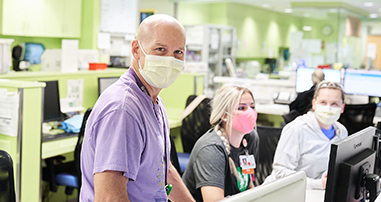
Multisystem Inflammatory Syndrome in Children (MIS-C)
Multisystem Inflammatory Syndrome in Children (MIS-C) is a condition in which the heart, lungs, kidneys, brain, skin, eyes or abdominal organs become inflamed, according to the Centers for Disease Control and Prevention (CDC). It affects a very small number of children who have had COVID-19 or have been exposed to someone with COVID-19.
What are the Symptoms of MIS-C?
Some children may have one or more of the following symptoms:
- Unexplained or persistent fever
- Abdominal pain, which may lead to vomiting or diarrhea
- Neck pain
- Rash
- Red eyes
- Swelling around the eyes, hands or feet
Most children with MIS-C appear to be ill and do not act like themselves, showing signs of being extra tired.
Seek emergency care right away if your child is showing any of these emergency warning signs:
- Trouble breathing
- Pain or pressure in the chest that does not go away
- New confusion
- Inability to wake or stay awake
- Bluish lips or face
- Severe abdominal pain
What should I do if I think my child has MIS-C?
Contact your child’s pediatrician or seek medical care if your child’s pediatrician is not available. It is important for your child to see a doctor if you are worried about the way your child looks or is acting.
Seek emergency care right away if your child is showing any of these emergency warning signs:
- Trouble breathing
- Pain or pressure in the chest that does not go away
- New confusion
- Inability to wake or stay awake
- Bluish lips or face
- Severe abdominal pain
How are we testing for MIS-C at Children’s?
If a doctor determines your child may have MIS-C, they may conduct tests to look for inflammation and other signs of MIS-C. These may include:
- Blood tests
- X-rays
- Echocardiogram (heart ultrasound)
- Abdominal ultrasound
Children’s continues to work with experts at the Georgia Department of Public Health (GDPH), CDC and other healthcare centers to learn more about MIS-C and how it affects a child’s health. Be sure to check back often as we update information about the syndrome.
Parents, We’re Here to Help
Contact Us 404-785-KIDS (5437)




